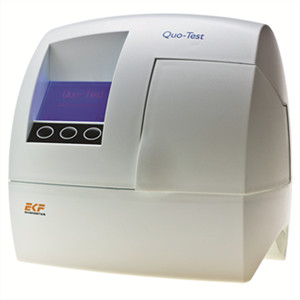Home > News > European Reference Laboratory reaffirms EKF’s Quo-Test® meets HbA1c criteria
European Reference Laboratory reaffirms EKF’s Quo-Test® meets HbA1c criteria
- Lenters-Westra, E. & English, E. Understanding the use of sigma metrics in hemoglobin A1c analysis. Clin Lab Med 2017;37: 57-71.
- Weykamp, C., John, G., Gillery P. et al. on behalf of the IFCC Task Force on Implementation of HbA1c Standardization. Investigation of 2 models to set and evaluate quality targets for HbA1c: biological variation and sigma-metrics. Clin Chem 2015;61(5): 752-9.
- Lenters-Westra, E. An evaluation of the Quo-Test performance against NGSP and sigma-metrics. 2016 White Paper available for download at: https://www.ekfdiagnostics.com/quo-test.html
European Reference Laboratory for Glycohemoglobin study reaffirms EKF’s Quo-Test® meets HbA1c performance criteria
Quo-Test point of care HbA1c analyzer readily meets key performance criteria for diabetes patient monitoring
Cardiff, UK – 16th February 2017 – EKF Diagnostics, the global in vitro diagnostics company, announces that in a newly published paper [1] its Quo-Test® point-of-care (POC) hemoglobin A1c (HbA1c) analyzer has again been confirmed to meet International Federation of Clinical Chemistry and Laboratory Medicine (IFCC) performance criteria. Using sigma-metrics data modelling, scientists from the European Reference Laboratory for Glycohemoglobin demonstrated that Quo-Test easily met IFCC accepted quality targets of >2 sigma at 10% total allowable error (TAE) at 48 mmol/mol HbA1c. This is essential for the effective monitoring of glycemic control in diabetes patients.
Under strict evaluation conditions, Quo-Test was not only shown to perform extremely well against routine laboratory analyzers, certified as secondary reference measurement procedures (SRMPs), but also when compared to six other POC HbA1c analyzers. The authors explained that in the laboratory, sigma-metrics is a quality management strategy that provides a universal benchmark for analytical performance - effectively placing all analyzers on a level playing field. Using sigma-metrics, analytical characteristics (bias and imprecision) are placed in the form of TAE within a framework of clinical requirements. An IFCC Task Force in 2015 advocated the use of sigma-metrics quality targets for HbA1c to standardize analytical quality at a global level [2].

EKF’s Quo-Test CE-marked for monitoring HbA1c in diabetes patients
For a high resolution image, please contact sarahp@alto-marketing.com
This latest study [1] follows the release of critical evaluation data by the European Reference Laboratory for Glycohemoglobin published in a white paper in 2016 [3], which also demonstrated Quo-Test’s strong performance. In the white paper Quo-Test’s performance in sigma-metrics was very good. Sigma was shown to be >2 at 48mmol/mol and at an HbA1c value of 75 mmol/mol >4. Examining the CVs of all duplicates, one lot number even had a sigma of >6; this is a class-leading level of performance.
Notably, within the 2016 evaluation study, the boronate affinity fluorescence quenching technology employed by Quo-Test was demonstrated to maintain results consistency due to its ability to minimize the effects of hemoglobin variants. This compared well with laboratory-based HPLC systems. Quo-Test showed no interference of the common Hb-variants HbAS, HbAC, HbAD, HbAE, HBAJ, elevated A2 and HbF<8.6%.
“We are pleased that the European Reference Laboratory for Glycohemoglobin has reaffirmed that Quo-Test fully meets accepted global performance criteria for HbA1c analysis,” said Gavin Jones, Global Diabetes Product Manager, EKF Diagnostics. “We are extremely confident that our Quo-Test is one of the most accurate, easy-to-use and reliable HbA1c POC analyzers available, which is also unaffected by most hemoglobin variants.”
CE-marked for the monitoring of HbA1c in diabetes patients, Quo-Test is specifically designed for use in a POC setting, such as diabetes clinics and doctors’ surgeries. It is fully automated, measuring HbA1c from a 4 µL sample taken from a finger prick or venous whole blood. Results are available in four minutes within a measuring range of 4-15% A1c DCCT, and precision performance with a CV of 2.2% at 6.6% DCCT has been demonstrated [3].
For more information on EKF Diagnostics, please see www.ekfdiagnostics.com.
References:
About EKF Diagnostics - www.ekfdiagnostics.com
EKF Diagnostics Holdings plc, which includes the EKF Diagnostics, Stanbio Laboratory and DiaSpect brands, specializes in the development, production and worldwide distribution of point-of-care analyzers for use in the detection and management of diabetes, anemia, lactate and kidney related diseases. EKF products are sold in more than 100 countries around the globe, through a network of specialist distributors.
Point-of-care diagnostics: EKF Diagnostics designs and manufactures world-class diagnostic devices, as well as distributing rapid test kits for infectious diseases and pregnancy. The EKF analyzer range is used widely in GP surgeries, pharmacies, blood banks, sports clinics, hospitals and laboratories for glucose, lactate, hemoglobin, hematocrit and HbA1c measurement.
Central laboratory: EKF, through its wholly owned subsidiary, Stanbio Laboratory (Boerne, Texas, USA), manufactures a comprehensive range of clinical chemistry reagents, as well as associated analyzers. In addition, EKF Life Sciences (Elkhart, Indiana, USA) manufactures enzymes used in reagent development and also provides contract fermentation facilities.
Related News
- Flow Photochemistry Enables Peptide Breakthrough 2/20/2025
- Multispectral Imaging Camera Reveals Behaviour of Materials Impacted at High Vel 2/20/2025
- ZHUOYUE Laboratory Water Dispenser System Offers True Flexibility to Users 2/20/2025
- Ready-to-use hiPSC-derived Cells Help Optimize Lab Workflows. 2/19/2025
- Ultrasonic Flow Meters: Clamp-on Versus In-Line for Advanced Flow Measurement 2/18/2025
- How to Select an Optimum Lens for your Camera or Sensor? 2/18/2025
- AFYS3G: Innovating High Throughput Tube Marking 2/17/2025
- Thermo Fisher Scientific Introduced the Invitrogen™ EVOS™ S1000 Spat 2/15/2025
- Protheragen-ING’s AI-Synthesizer Helps to Streamline the Synthesis of Small Mole 2/14/2025
- OGT Delivers Superior MRD Detection Capabilities with New SureSeq Myeloid MRD Pa 2/7/2025


